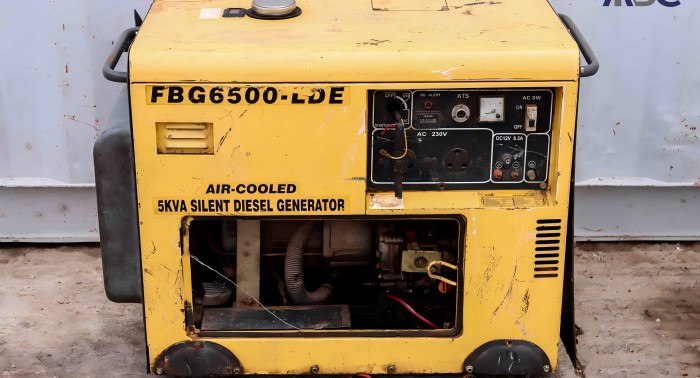Diesel generators are widely used in a variety of applications, from providing backup power during outages to powering remote locations and construction sites. One of the key metrics for evaluating a diesel generator’s performance is its ability to produce kilowatt-hours (kWh) of electricity. This measurement helps determine how much energy a generator can deliver over a specific period. In this article, we’ll explore the factors that influence a diesel generator’s kWh output and how to calculate it, giving you a clearer understanding of its energy production potential.
Understanding Kilowatts and Kilowatt-Hours
To understand how many kilowatt-hours (kWh) a diesel generator can produce, it’s important to grasp the relationship between kilowatts (kW) and kilowatt-hours. Kilowatts measure the rate at which power is generated or consumed, while kilowatt-hours represent the total amount of energy used or produced over time.
For example, a 10 kW generator can produce 10 kilowatts of power at any given moment. If this generator runs for one hour at full capacity, it will generate 10 kWh of electricity. Therefore, the kWh output of a generator depends on both its power capacity and the duration it operates.
Calculating kWh Output
The basic formula for calculating the energy output of a diesel generator in kilowatt-hours is as follows:
Energy (kWh) = Power (kW) × Time (hours)
This means that if you know the generator’s power rating and the number of hours it has been running, you can easily determine how much energy it has produced. For instance, if a 20 kW generator operates continuously for 6 hours, the total energy output would be:
20 kW × 6 hours = 120 kWh
This calculation assumes that the generator is running at full capacity the entire time. However, in real-world conditions, the actual kWh output may vary due to several factors such as load conditions, efficiency, and fuel consumption.
Factors Affecting kWh Production
While the formula for calculating kWh is straightforward, several factors influence how much energy a diesel generator can produce in practice. These factors can impact both the generator’s efficiency and its overall performance.
Generator Size
The size of the diesel generator, typically measured in kilowatts, is the primary determinant of its maximum energy output. Larger generators with higher power ratings can produce more kWh of energy over time. For example, a 100 kW generator will generate more electricity than a 10 kW generator if both are operating under similar conditions. When selecting a generator, it’s crucial to consider the energy demands of the application to ensure the generator’s capacity meets those needs.
Load Conditions
The load on the generator plays a significant role in determining how much kWh it produces. Diesel generators are most efficient when operating at a certain percentage of their rated capacity, usually between 50% and 80%. Operating below or above this range can lead to reduced efficiency and lower kWh output. For example, if a 20 kW generator is only running at 10 kW, it will produce fewer kWh than if it were operating at its optimal load.
Fuel Consumption
The amount of diesel fuel consumed by the generator is directly related to the energy it produces. Diesel generators convert fuel into electricity, and their fuel efficiency determines how many kWh of energy are generated per gallon of diesel. More efficient generators can produce more kWh for the same amount of fuel. Monitoring fuel consumption and optimizing generator operation can help maximize kWh output while minimizing fuel costs.
Operating Conditions
Environmental factors such as temperature, altitude, and humidity can affect the performance of a diesel generator. For example, at higher altitudes, air density decreases, which can reduce the efficiency of the generator’s engine and lead to lower kWh output. Similarly, extreme temperatures can impact the generator’s ability to operate efficiently, potentially reducing the amount of energy it produces.
Maintenance and Wear
Regular maintenance is essential for ensuring that a diesel generator operates at peak efficiency. Over time, wear and tear on the generator’s components can lead to reduced performance and lower kWh output. Keeping the generator well-maintained, including routine oil changes, filter replacements, and inspections, can help ensure that it continues to produce the expected amount of energy.
Examples of kWh Production
To better understand how much energy a diesel generator can produce, let’s look at some examples of kWh output based on different generator sizes and operating times:
Example 1: A 10 kW generator running at full capacity for 8 hours would produce 80 kWh of energy (10 kW × 8 hours).
Example 2: A 50 kW generator operating at 75% load for 10 hours would produce 375 kWh of energy (50 kW × 0.75 × 10 hours).
Example 3: A 200 kW generator running at 50% load for 24 hours would produce 2,400 kWh of energy (200 kW × 0.5 × 24 hours).
These examples illustrate how varying the generator’s size, load, and operating time can significantly impact the total kWh produced.
Conclusion
The amount of kilowatt-hours a diesel generator can produce depends on several factors, including its size, load conditions, fuel efficiency, and operating environment. By understanding these variables and properly maintaining the generator, you can optimize its performance and ensure that it meets your energy needs effectively. Calculating the kWh output of a diesel generator helps in planning for fuel usage, operational costs, and energy supply, making it a critical aspect of managing generator performance.

